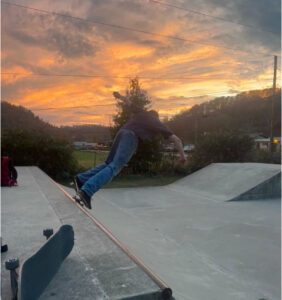 To many students’ dismay, WCU’s policy banning skateboarding is campus wide and active, prohibiting students from using skateboards for leisure or transportation anywhere on WCU streets and sidewalks
To many students’ dismay, WCU’s policy banning skateboarding is campus wide and active, prohibiting students from using skateboards for leisure or transportation anywhere on WCU streets and sidewalks
The ban, which also prohibits the use of rollerblades and roller skates, aims to promote a safe environment on campus. As skateboarding is an accident-prone sport, the policy is intended to prevent falls that may cause bodily harm to riders and others, as well as the damage that loss of control of a board can cause. But it has been called to question by some whether the policy is necessary or efficient.
The ban is not a new one. It has been in effect since 2011, but with the addition of electric scooters as regular transportation for students on campus, discussion that the policies should be revised has once again sparked and talk of petitioning the ban has arisen.
Xander Graves, a junior at WCU, plans to propose a petition that he believes skaters in the community will sign.
“It was pretty straightforward because so many wheeled transportation aids are already allowed. With the ideas of a skate park being proposed to the local Jackson County government as well, I think skating is the perfect outdoor activity to introduce to our community here and surrounding,” Graves said.
In finding a solution, Graves researched skating laws as well as safety.
“From my research, some local state laws restrict reckless skateboarding, such as skating at high speeds, performing dangerous stunts or skating in crowded, vehicular, private or downtown areas,” Graves explained in a text message. “But skateboarding has never been limited out as an illegal mode of transportation other than on our campus.”
The aim of this petition is to remove the complete ban of skateboarding on campus, so campus policies more closely align with community laws.
Though getting caught using a skateboard can result in a citation or $50 fine, skaters continue to dismiss and pushback against the policies. Skateboarders are often seen around campus despite the ban, disregarding the rule and vocalizing desires for change.
“I’d say if you see the police while you’re skating it’s like 50/50 if you get stopped or not,” said Cole Dellinger, a freshman at WCU. “It’s pretty useless, people are going to skate where they want. Most skaters aren’t trying anything dangerous enough to really get hurt, and the ones that do are more than likely going to be prepared for it.”
Brian Thomas, assistant chief of the University Police Department, explained some of the concerns university police have around skateboarding on campus.
“If you fall off your bicycle, you’ve got a set of handlebars, and you fall together. You may fall down or hurt yourself, but you’re probably going to hang on to your bicycle. You fall off your skateboard, you usually go one way, the skateboard goes another direction. And that’s a bit of a concern for us,” Thomas said.
Thomas expressed that campus police have no opinion for or against the ban on skateboarding. They merely enforce the rules to keep everyone safe.
Students Leon Corbett, a junior at WCU, are proposing to have dedicated skating areas around campus for skaters to get together and practice. Thomas said that this is something that needs to be put forward through student government.
“It depends on where they pick the area, and a lot of it comes down to safety equipment. I think it’s a bigger conversation,” Thomas said. “But they have an option to do that through their Student Government Association. SGA can actually take that up, and they can bring it to the university administration.”
Regarding the proposal of a petition to remove the campus ban on skateboards, SGA Vice President Jarrod Seifert said SGA is open to working with students on this possible change. Seifert said he has been advising students working on a resolution regarding skateboarding on campus. All that is needed to move forward is the support from the chief of UPD.






